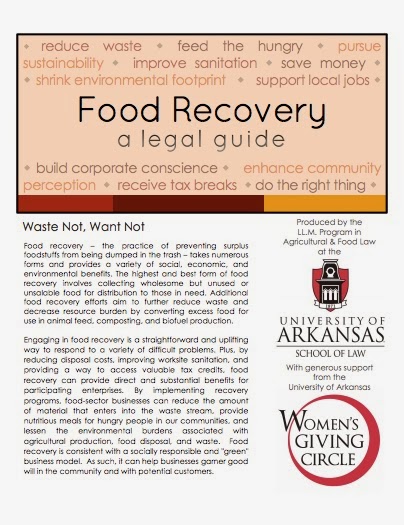Food Waste: Important Issue Gets Attention
Last year, the LL.M. Program in Agricultural & Food Law at the University of Arkansas School of Law began the Food Recovery Project. The goal of this Project is to raise awareness of two fundamentally irreconcilable problems: the overwhelming waste of food and the persistent problem of hunger in America. The project is designed to provide resources, legal information, and other information that will encourage and support businesses in developing and implementing food recovery programs.
This Project was funded by generous support from The Women�s Giving Circle. Research Fellow, James Haley began the Project by doing a comprehensive study of food recovery and the law and prepared A Legal Guide to The Bill Emerson Good Samaritan Food Donation Act. This article, written for attorneys, is published in the University of Arkansas School of Law's online journal, Law Notes.
Visiting Professor Nicole Civita then produced a guide that explains the legal liability protections available to those who donate their food to a non-profit organization. Food Recovery: A Legal Guide is designed for businesses and organizations. Both publications are available for free download.
Through the Food Recovery Project, our awareness of food waste and its consequences has been heightened. We have been gratified to see the issue gaining increasing recognition in the media. It's important no only because of hunger issues, but because of environmental concerns. The USDA and EPA, issuing a joint Food Waste Challenge, report that "Food waste [is] the single largest type of waste entering our landfills" with about 40% of food in the U.S. wasted.
Other groups are also publicizing the problem.
This Project was funded by generous support from The Women�s Giving Circle. Research Fellow, James Haley began the Project by doing a comprehensive study of food recovery and the law and prepared A Legal Guide to The Bill Emerson Good Samaritan Food Donation Act. This article, written for attorneys, is published in the University of Arkansas School of Law's online journal, Law Notes.
Visiting Professor Nicole Civita then produced a guide that explains the legal liability protections available to those who donate their food to a non-profit organization. Food Recovery: A Legal Guide is designed for businesses and organizations. Both publications are available for free download.
Through the Food Recovery Project, our awareness of food waste and its consequences has been heightened. We have been gratified to see the issue gaining increasing recognition in the media. It's important no only because of hunger issues, but because of environmental concerns. The USDA and EPA, issuing a joint Food Waste Challenge, report that "Food waste [is] the single largest type of waste entering our landfills" with about 40% of food in the U.S. wasted.
Other groups are also publicizing the problem.
- The report, The Dating Game: How Confusing Food Date Labels Lead to Food Waste in America was produced as a joint project of the NRDC and the Harvard Food Policy Clinic. As that report reveals,"[a]ll those dates on food products -- sell by, use by, best before -- almost none of those dates indicate the safety of food." One of the authors, Food Policy Clinic Director, Emily Broad Lieb was interviewed widely in the press, including a spot on the Today Show.
- The Food Recovery Network unites students at colleges and universities to find ways to prevent food waste in their communities and to recover food for those in need.



Comments
Post a Comment